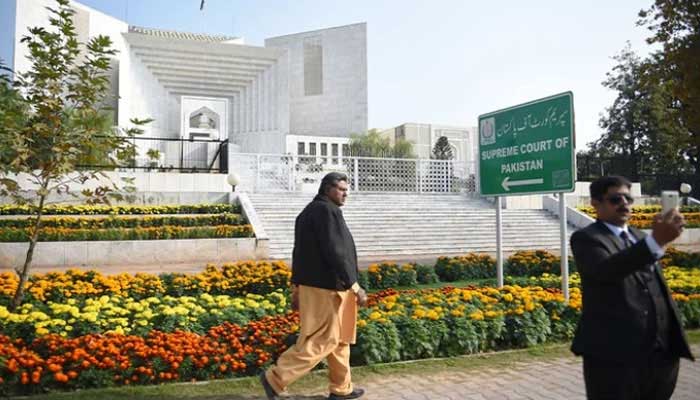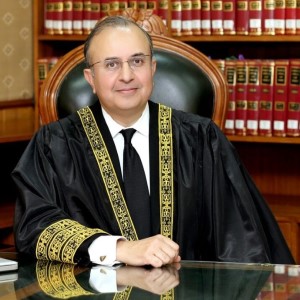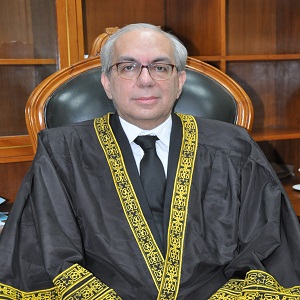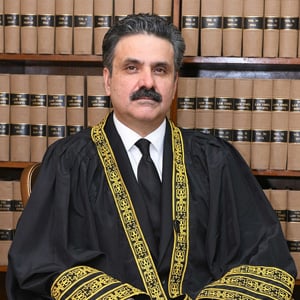Who could succeed Justice Qazi Faez Isa as CJP?
CJP Isa will send names of three senior-most judges to parliamentary committee under sub-clause 3 of Article 175A
After weeks of political wrangling, the coalition government finally managed to secure parliament’s approval for the contentious 26th Constitutional Amendment Bill, amending the process of appointment of Chief Justice of Pakistan (CJP).
The bill, which has been a bone of contention between the government and the opposition, contains a set of amendments, including tenure and appointment of the country’s top judge and evaluation of judges’ performances.
The amendments come just days before the retirement on incumbent CJP Qazi Faez Isa on October 25. Under the previous law, the incumbent CJP would have been automatically replaced by the senior puisne judge — Justice Mansoor Ali Shah.
However, the amendment changed the method and now a 12-member special parliamentary committee will pick one name from the three senior-most judges of the Supreme Court with two-thirds majority.
This Special Parliamentary Committee, consisting of eight members from the National Assembly and four from the Senate, will then send the selected name to the prime minister, and subsequently the president, for approval.
CJP Isa will send the names of three senior judges to the committee under sub-clause 3 of Article 175A.
If any of the three senior judges declines the position, the next senior judge will be considered. Currently, Justice Shah is the most senior judge, followed by Justice Munib Akhtar, and Justice Yahya Afridi.
A report published in The News last week suggested that Justice Afridi would likely be appointed the next chief justice of Pakistan, as well-placed sources in the government and its allies are likely to support his appointment.
"It is noteworthy that in recent times, when the apex court judges have been badly divided, Justice Afridi has remained non-controversial and neutral," the report added.
Here is a brief overview of three SC judges.
Justice Mansoor Ali Shah
Justice Shah was elevated to the bench at the Lahore High Court in 2009 and after serving as the Lahore High Court (LHC) Chief Justice for almost two years, he was elevated to the Supreme Court of Pakistan in early 2018.
He did his schooling at Aitchison College, Lahore and got his law degree from the University of Cambridge, UK, as well as, the University of the Punjab, where he also obtained a degree in Masters in Economics.
He espoused a passion for teaching and taught law for almost two decades at the Lahore University of Management Sciences (LUMS), Pakistan College of Law and Punjab Law College, Lahore. He was also part of the steering committee that established the law school at LUMS, now called Shaikh Ahmad Hassan School of Law (SAHSOL).
His areas of special interest are constitutional law, human rights, climate and water justice, environmental sustainability, disability rights, criminology, digital surveillance, privacy and proportionality.
He believes in continuous judicial reforms; he spearheaded the formation of Alternate Dispute Resolution Centers (ADRC) in Punjab as the Chief Justice to provide an alternative to litigation in order to reduce the chronic backlog and staggering pendency of cases.
He set up Criminal and Civil Model Courts to create working coordination between stakeholders in order to speed up dispensation of justice, introduced Case Management and Court Automation Systems in Punjab both at the Lahore High Court and the District Courts, installed first ever Enterprise IT System with the help of Punjab Information Technology Board (PITB) to sustain the IT vision of the court for the next decade and to make the judicial system; open, transparent, smart and fully connected at all levels.
At SC, he helped establish e-courts by video linking the Principal Seat of the Supreme Court with all the Provincial Registries of the Supreme Court, which has helped save travel cost to Islamabad from all over the country and has brought relief to the working schedule of the lawyers.
Justice Shah is an accredited mediator from CEDR, London; an Honorary Bencher of Lincoln’s Inn, UK; a judicial member of the Global Judicial Institute on Environment (GJIE) (Brazil); a member of the Global Constitutionalism (Yale University, 2020- ) and a Member of the Rhodes Scholarship Committee for Pakistan (2019- ). He is an avid golfer, loves sports and enjoys cycling, reading, travelling and music.
Justice Munib Akhtar
Born on December 14, 1963, Justice Akhtar received his early education at Aitchison College, Lahore. He went on to earn his Bachelor of Arts degree from Government College Lahore and also Princeton University, USA. He obtained his LLB degree from Punjab University Law College in 1989.
He was enrolled as an advocate of the High Court in 1992 and as an advocate of the Supreme Court in 2009.
Akhtar’s judicial expirence contains sitting on benches on original side and appellate side in all areas including: civil, corporate, criminal, tax, labor/service, etc. at Principal Seat and at Sukkur and Hyderabad.
He also served as chairman and/or member of various committees, including: Civil Rules Committee, IT Committee, Judicial Studies Board, Promotion Committee, Procurement Committee.
He was elevated as a Judge of the Supreme Court of Pakistan on 08th May 2018.
Justice Yahya Afridi
Justice Afridi was born in Dera Ismail Khan on 23rd January 1965. He belongs to the Adam Khel section of the Afridi tribe located in the Kohat Frontier Region and is a resident of Village Babari Banda, District Kohat. He belongs to a family steeped in a tradition of public service.
He received his early education at Aitchison College, Lahore. He went on to earn his Bachelor of Arts in Political Science and Economics from Government College Lahore and later obtained his Masters of Arts degree in Economics from Punjab University, Lahore.
After being awarded a Commonwealth Scholarship, Justice Afridi completed his LL.M. from Jesus College at the University of Cambridge. He was subsequently selected for a scholarship program for Young Commonwealth Lawyers at the Institute of Legal Studies in London.
He started his private practice in Peshawar and lectured at Khyber Law College, University of Peshawar where he taught International Law, Labour Law and Administrative Law.
He was enrolled as an advocate of the High Court in 1990 and as an advocate of the Supreme Court in 2004. He served as an Assistant Advocate General for the province of Khyber Pakhtunkhwa and as a Federal Counsel for the Government of Pakistan while in practice.
Afridi was elevated to the Bench of the Peshawar High Court as Additional Judge in 2010 and was confirmed as a Judge of the Peshawar High Court on 15th March 2012.
Justice Afridi became the first judge from the Federally Administered Tribal Area to assume the office of the Chief Justice of the Peshawar High Court when he took oath on 30th December 2016. He served in that office until his elevation as a Judge of the Supreme Court of Pakistan on 28th June 2018.
-
Security forces gun down 30 terrorists in multiple IBOs in KP: ISPR
-
MQM-P calls for new province in Sindh
-
US report validates Pakistan military edge over India: PM
-
Banned TTP poses serious threat to Pakistan security: UNSC panel
-
CM Afridi clarifies remarks on by-poll after ECP requests army deployment
-
Dubai sees 3.2m Pakistani passengers in 2025 as airport sets new milestone
-
Security forces kill 23 Indian proxy terrorists in KP's Kurram
-
Pakistan to construct island to boost oil exploration: report















